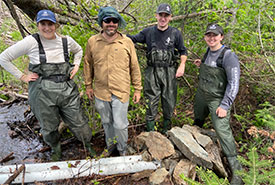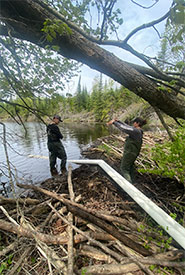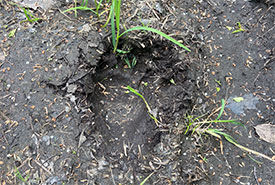NCC: Land Lines – Close encounters: Baffling beavers and tracking elk at Hastings Wildlife Junction

The Large Landscapes Team with beaver baffler (Photo by NCC)
A great day packed with sights and sounds for the large landscapes team at the Hastings Wildlife Junction!
Back in May 2023, the Nature Conservancy of Canada’s (NCC’s) staff were made aware of flooding along a trail due to beaver damming of the adjacent wetland. NCC uses the property’s existing trails for the purposes of inventory, monitoring and property management. The Hastings Wildlife Junction protects a series of wetlands that adjoin ponds and small lakes. The large beaver dam in the adjacent wetland had completely submerged a trail in water.
As a resolution to the flooding, our team decided to install a beaver baffler! A beaver baffler is a series of plastic pipes placed inside a wire cage at one end of a beaver dam, at the desired water height in the pond, to stop beavers from clogging the pipe with debris. This device allows water to flow freely through the dam without disturbing the beavers and lowers the water levels, preventing flooding on nearby roads or trails. At the outlet end of the pipe, rocks are stacked around the pipe to hold it in place and to lessen the sound of flowing water, which beavers would then look to plug up if they heard it (they’re basically flowing water detectives, always on the lookout for clues that water is on the move!).

Beaver baffler (Photo by Sabrina Hasselfelt and Danielle Pearcy/NCC)
Our team of three, with the help of large landscapes program director Kristyn Ferguson and one of NCC’s Conservation Volunteers, threw on our waders and were able to quickly install the beaver baffler in the dam — and remain undetected by the beavers!
We then continued on a hike through the property and observed many frogs and toads, saw a beautiful smooth green snake, and heard the calls of a Canada warbler, a species at risk in Ontario. Looking for tracks, we found those of a black bear, which we often find within the Central Ontario Corridors natural area. Further along, we came across multiple sets of tracks that we don’t see too often: elk!

Bear print, Hastings Wildlife Junction, ON (Photo by Sabrina Hasselfelt and Danielle Pearcy/NCC staff)
The reintroduction of elk has been a priority for the province of Ontario and in many areas of Canada, and has been successful in central Ontario. The multiple sets of tracks were more tooth-shaped than the narrow heart-shaped moose tracks that we usually came across, which made it more probable that they were in fact, elk. We followed the tracks as far as we could until we reached the NCC property boundary. It is amazing to know that we have elk so close to home, and that we can conserve this large habitat as part of their growing territory.
As we hiked back to where we’d started our day, we were thrilled to see the water across the trail noticeably lowering, meaning our beaver baffler was doing its job! Beavers are important ecosystem engineers, not to mention iconic native mammals that NCC is committing to protecting. We just hope that the next time they build a little more off the beaten path to ensure their habitat needs are met, while ensuring safe and dry passage for visitors to the Hastings Wildlife Junction.



